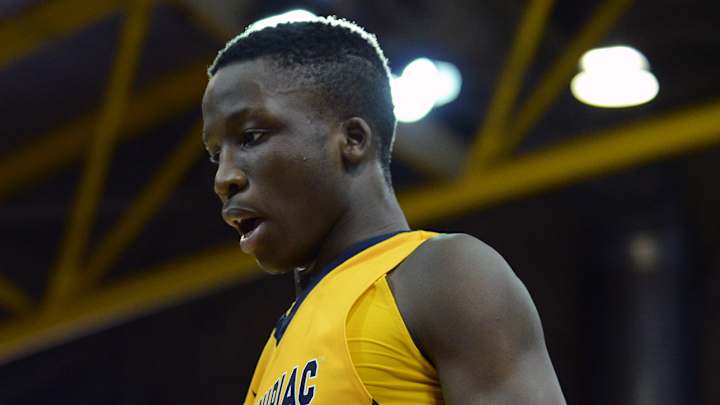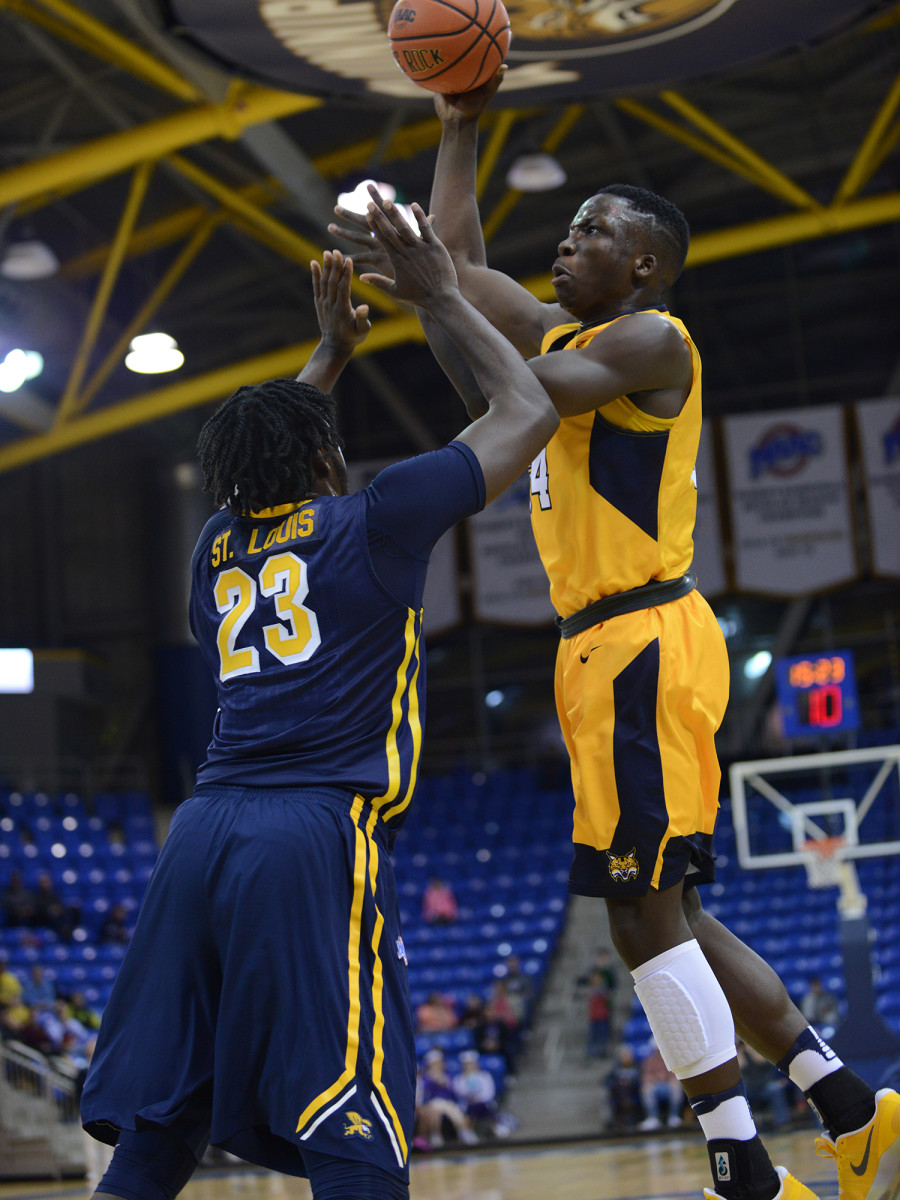Abdulai Bundu Wants You to Know the Price and Payoff of an Immigration Success Story

The story of how Abdulai Bundu came to be a forward on Quinnipiac’s basketball team is an amazing one. It starts with a boy whose parents won an immigration lottery and left a warring and unstable Sierra Leone for the United States before their youngest son’s first birthday. That boy lives with grandparents, aunts, and uncles, lives in refugee camps, is held at gunpoint as a toddler. Then, when the boy is seven, he is able to join the mom and dad he hardly knows in the U.S. The boy is a tall eighth-grader in Maryland when a middle school teacher suggests he take up basketball. He hates it at first but eventually gets so good it earns him a full scholarship to a Division I school. As a junior he averages 5.5 points and 5.7 rebounds while playing through various injuries and, at 6’7”, battling in the post as an undersized five. He studies sociology, makes good grades. His coach, Baker Dunleavy, calls him invaluable.
But what if Bundu wasn’t a critical part of the team? What if he spent games glued to the bench? What if he missed every shot he took? Or walked on at a D-III? Or never picked up a ball? What if the country he was born into had not been under siege of civil war? What if he were struggling in class? What if his story were a little less amazing, led him somewhere a little more obscure?
Abdulai Bundu, or Dulli to his fellow Bobcats, is an exemplary story of American immigration and success, as well as a human nexus of hot-button issues: an immigrant, a Muslim, the son of immigration-lottery winners who in turn sponsored his own visa. At times like these—with nativism informing national policy and hairs being split over whether the president called an entire continent a shithole or a shithouse—many immigration proponents eagerly trot out stories like Bundu’s. They cite statistics about the number of immigrants who start small business and the high education rates of those coming from Africa, or single out individual high-achievers. And while these illustrations can be helpful counterpoints to the depictions of unassimilated job-stealers, there is also an implication that compassion toward them must be earned through achievement, like merit badges.
Yes, Bundu is one such example, exceptional in many ways and in some form being used here in this very text. But that is one of the powers of sports. They can allow us to stop and get to know people we might not otherwise, take a peek at others’ humanity and listen to their stories. Bundu knows the opportunity this affords him.

“Having the platform I do, I want to take advantage of it and just inform people,” says Bundu, who is a naturalized U.S. citizen. “There’s more to me than just a basketball player and where I’m from plays a big part of who I am as a person. I always tell people I’m from Maryland, but I was born in Sierra Leone, West Africa.”
This is why Bundu gets so upset when he hears the way that region is discussed and sees how it’s often depicted. Even before reports of the president’s comments he had to deal with classmates whose only reference point for his birth country was the film Blood Diamond. But the Sierra Leone that Bundu reminisces about is not a shithole nor ravaged by the decade-long war that ended in 2002. He remembers the generosity of his neighbors, the family-style cassava leaf dinners, the tree he used to climb on walks home from elementary school. “What you see on TV or whatever you’ve heard is not really what it is,” Bundu says. “There’s two sides to everywhere you go.”
The other side was admittedly adverse. The country’s civil war, which Bundu can hardly remember, killed hundreds of thousands and displaced millions more. Bundu was not yet two when rebels robbed his grandmother’s home before burning it down. Economic opportunity was scarce. “Everybody back home wanted to come to the United States,” says Bundu, who lived in the capital city of Freetown. “It was the dreamland for a lot of us.”
Which is why, when his parents landed an opportunity to move to the U.S., they left 11-month-old Abdulai and his seven-year-old brother, Osman, with their grandparents, in hopes of building a better life their sons would someday join. Abdulai’s parents, Mohamed and Abibatu, lived in Virginia and New York before settling in Maryland. Mohamed washed dishes and later enlisted in the Army; Abibatu worked as a nurse’s assistant. They saved what they could and sent money across the Atlantic. Every few months they would make expensive calls home. For years, the phone was the only connection Abdulai could remember having with his parents.
Reuniting with them in Maryland at age seven, when Abdulai and his brother could finally immigrate as well, began a period of massive changes and adjustments. It took a year for Abdulai to grow comfortable calling his parents Mom and Dad. He had two younger brothers born here whom he had never met. So much of this new country was new and unknown. He hardly spoke its language, which got him bullied on the schoolbus. In class he hardly spoke, knowing more answers than his burgeoning English enabled him to say.
This, Bundu says, is what immigration critics and skeptics often overlook—the sacrifices made like those made by his parents, the lengths they went to in order to support their family on one continent and build their own on this one. “The goal is still the same” as anyone else’s, he says, “just trying to help better yourself and your family.”
The Bundus are examples of what immigration opponents now label “chain migration” but what was more accurately classified by the Immigration and Nationality Act of 1965 as “family reunification.” (Critics falsely claim that immigrants can bring unlimited numbers of distant relatives; current law permits only spouses, siblings, and children.) The criticism of what his and so many other families have done baffles Bundu. “That’s the point,” Bundu says. “They came over, they struggled, they finally settled in, and they brought us over to help us.” The current White House immigration reform proposal would end even the way Bundu’s parents arrived, via the diversity lottery that grants visas to 50,000 of the 10 to 20 million annual applicants from nations with low immigration rates, who are then vetted before being granted green cards.
Asked about that possibility, Bundu lets out a deep sigh and turns his head to the side, collecting his thoughts with restraint. “That’s just foul,” he says. “If you try to cut that off, you’re ending people’s hope to better their life and better their future. That’s really all I’ve got to say about that whole topic. You just can’t do that.”
Bundu’s goal is to help others the way his parents helped him. He hopes to someday buy a house for his mother, a nurse, and help his father, who works at a V.A. hospital, fund a medical facility back in Sierra Leone, where he also hopes to someday own a home of his own. (Abdulai has not been back since leaving for the U.S.) Osman, his brother, is a barber in Maryland. A year and a half from graduation, Abdulai’s own career path is uncertain, but not for lack of ideas. “My mind is everywhere, man,” he says. “Eventually I feel like I will find the right fit for me.”
First he is sharing his story, if reservedly. It is not one he tells unprompted, but he is comfortable answering questions and proud to explain his heritage on the occasional day he wears a dashiki to class. Last March he was profiled in the Hartford Courant, where some of the details shared by his family—for instance, asking his parents why they left he and Osman with the rebels in Sierra Leone—were new even to him. Some friends were mad he hadn’t told them all of that before. On campus strangers approached to tell him the power of what they read.
His own story may be unique, but he knows part of its importance is the broader light a single person’s experience can cast on those who may not be seen—immigrants no less deserving of their place in this country because it is a less prominent one, or because they have demonstrated a less marketable skill. “I don’t want to sit here and say I’m the only person who went through this because I know there are people like me,” Bundu says. “But I feel the overall point is just to try to inform people.”
So yes, Abdulai Bundu’s story is an amazing one—one he wants you to know, one that you should, one among many. And now that you’ve listened to his, listen to theirs too, wherever they may be.
